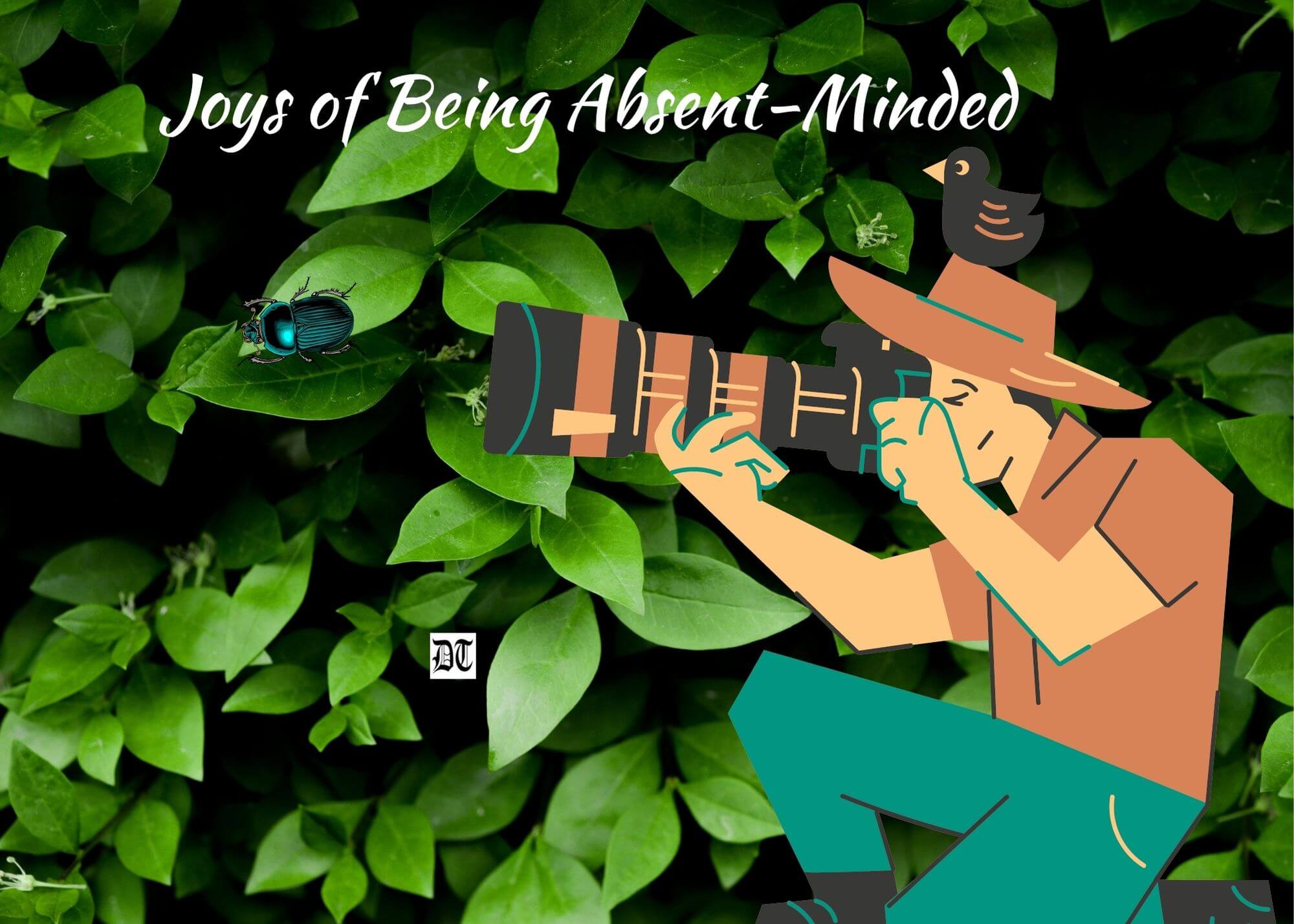Dr. Swaraj writes about the boons and banes of absent-mindedness, sparkling with wit, humour, and erudite scholarship. An exclusive for Different Truths.

It was a glorious May morning. Thrilled by the presence of a red and black beetle I made a dash for my camera. The day had begun well. The beetle perched on a palm leaf in the backyard was a new discovery. The mind was focussed, driven to seize the day.
However, something weird, though not totally unexpected happened. I clicked a few photographs. But when I pressed the playback button, only demo images surfaced. To my horror I realised that there was no memory card in the camera! By the time the card went into its allotted slot, the beetle had vanished. There was nothing left but to rue the missed opportunity and brood over it.
With my mind taken up with the beetle, forgetting the memory card was on the cards.
How could I manage to do it? Only the previous night I had transferred photos from the memory card to my laptop. The card was still there. With my mind taken up with the beetle, forgetting the memory card was on the cards. But this wasn’t just a one off blooper. The journey of my life is bestrewn with such minor calamities.
Exploring Spaces
The Covid-19 lockdowns had prompted us to start exploring our spaces, both within and without. Observing plants, leaves, buds, flowers, small insects, butterflies and moths became a daily ritual. Capturing their photographs and sharing our discoveries with kindred souls was definitely therapeutic. This was one of the ways to grapple with unending ennui.
There being no photographs, I had only this misadventure to share with a friend.
There being no photographs, I had only this misadventure to share with a friend. He is an artist with many distinctions to his name for being absent-minded. I knew I could depend upon him for sympathy. He did not disappoint. He responded with Keats’ words, “Heard melodies are sweet, but those unheard are sweeter.” A much-needed salve indeed to heal the hurt!
In a way, the unrecorded photographs were the visual counterpart of unheard melodies. Or even of unstruck melodies, the Anhad Naad. The missed photographs appeared much more beautiful than if they were actually recorded. The sense of loss had bestowed upon the beetle an aura of inexplicable beauty.
Missed Opportunity
I knew I had missed the opportunity. The moment to photograph the beetle had fled along with the beetle. But the loss made me aware of a uniquely human predicament. Nida Fazli muses on it in one of his couplets:
Duniya jise kahte hain jadoo ka khilona hai Mil jaye tou miiti hai, kho jaye tou sona hai. (The world, as we know it, is a magical toy Dust it is if we get it, and gold if lost.)
As it is, photographs as memento mori, are reminders of our mortality.
As it is, photographs as memento mori, are reminders of our mortality. The beetle was gone leaving just a faint image. There was nothing on the memory card. A living red insect with black stripes was just a trace, an affair of the mind. A trace necessitating introspection on loss, memory and forgetting. Is forgetfulness such a curse as it is made out to be? Is photographic memory a boon as many self-help books on memory will have us believe?

Absent-mindedness is no Curse
The more I dwelt on these issues, the more I realised that absent-mindedness is no curse. One can bumble through one’s life absent-mindedly and still be happy. In fact, as Scott A. Small in his Forgetting: The Benefits of Not Remembering (2021) suggests, “Forgetting is required for societal health and for creativity, lightening the mind for those eureka moments when unexpected associations are made. Without forgetting, all flights of creative fancy would be moored by memory.”
Scott is an American neuroscientist specialising in memory studies.
Scott is an American neuroscientist specialising in memory studies. In making a distinction between pathological and casual forgetting, he establishes benefits of forgetting to our cognitive and creative abilities.
A Dreaming Mind
Now imagine a situation. You go out to buy some sweetmeats. Your mind is elsewhere. Perhaps it is undergoing labour pains to birth an inchoate poem struggling for expression. You reach the shop, see a beautiful face and colourful sweets. Something strikes you like lightening. Viola! the poem peeps out of the chaos of words and images you were struggling with. You roll it in your mind like candy, a gustatory delight as much as ideational. Chewing the cud of sweet sensations, you forget why you were at the shop. Who can trust a dreaming mind to be bothered about the mundane? How can a person winging in the stratosphere fall into the quotidian?
The reception you get when you reach home with namkeen isn’t sweet.
Even if you remember vaguely why you were there, you forget the name of the sweetmeat. Either you return empty handed or with a packet of namkeen. The reception you get when you reach home with namkeen isn’t sweet. It can be insanely red hot ghost pepper from the North-East. But, this hot, spicy reception is too painful to dwell on. Hence it is better left to the imagination of the reader.
Forgetting Passwords
This was just one probable example, the real is equally colourful. Not having a head for numbers, I find it nearly impossible to remember numbers. The number of my car, scooter, bank account, debit card PIN, and so on. Endless is the list of such numbers. Forgetting passwords, undergoing the nightmarish rigmarole of setting and resetting them. I have suffered it all. The numbers territory has always been an alien land for me. Dates also belong to the same foreign land.
My crowning glories have been reaching wedding venues a day earlier or a day late, with my family in the tow.
My crowning glories have been reaching wedding venues a day earlier or a day late, with my family in the tow. But there is another incident that takes the cake. Once a National Seminar was held at a college, 250 kilometres from Patiala. I was an invited speaker and a friend, a University professor, the keynote speaker. Accompanied by the erudite professor and a Ph.D. student of his, we reached the venue. There were no banners, no intimation of the seminar going on anywhere.
We met the organising secretary and enquired about the seminar. He informed us that preparations were afoot for the event a month away. We told him that we were there for some work and dropped to see him. We came back rolling with laughter all the way. In fact, the only dates nobody can ever forget are only two in number. Your wife’s birthday and your wedding anniversary. Try doing so, you will realise what I mean.
Brain-fade Moments
There are many other brain-fade moments that punctuate my life on regular basis. Rummaging the entire house looking for spectacles, while peering through them. Going to the college wearing sneakers of two different makes to my colleagues’ amusement. What my students thought, I never tried to find out. Searching the smart phone turned on silent mode shoved inadvertently into a wardrobe. It would be found days later as accidentally as it was lost. Till then, an old unsmart stone of a Nokia would be tearing the shirt pocket.
Trying frantically to open someone else’s car door with my car key and not succeeding.
Trying frantically to open someone else’s car door with my car key and not succeeding. Looking sheepishly askance when the owner comes hearing the hooter warning of likely theft. Putting the tea bag box in the fridge in place of milk after making tea. Going to the bank wearing best clothes only to be told by the amused cashier, “Your zipper is down.”
Absent-minded Authors
Solace is to be found in the stories of legendary absent-minded authors and professors. Renaissance French philosopher Michel de Montaigne was very forgetful. In his essay, “Of Liars”, he writes, “When I complain of the [memory] defect of mine, they do not believe me, and reprove me, as though I accused myself for a fool…. But they do me wrong; for experience, rather, daily shows us, on the contrary, that a strong memory is commonly coupled with infirm judgment…. It is not without good reason said ‘that he who has not a good memory should never take upon him the trade of lying’.”
The inference being that a forgetful person cannot go morally wrong. He cannot be a liar.
The inference being that a forgetful person cannot go morally wrong. He cannot be a liar. A liar has to have near perfect memory if he wants to escape caught lying. This idea can be stretched further. A forgetful person cannot even be a thief. I know nobody would have imagined me a car thief when I fiddled with their car door.
Problematic Infallible Memory
Contrary to popular opinion, infallible memory can be extremely problematic. Ireneo Funes, a character in Jorge Luis Borges’ story “Funes the Memorious” forgets nothing. His unfailing memory was a gift from an injury he received from horse spill. His perfect memory makes his life a living hell. Borges writes: “He was, let us not forget, almost incapable of ideas of a general, Platonic sort.” He was not capable of thought because “To think is to forget differences, generalise, make abstractions. In the teeming world of Funes, there were only details, almost immediate in their presence.” He takes one full day to narrate one day in his life. And since he cannot turn his mind from the world, he cannot dream.
I wonder what will happen if science endows us tomorrow with unerring memories?
I wonder what will happen if science endows us tomorrow with unerring memories? Like Funes, we too will inhabit forever unforgiving and unredeemable time, since it is unforgettable. It is a scary Orwellian dystopia digital remembering is pushing us into. Forgiving and moving on is not possible without forgetting. Not at all possible if our perfect memory makes us forget the value of forgetting. Many psychologists believe what Funes’s life demonstrates. Hyperthymestic (superior) memory has no positive correlation with intelligence or creativity. Our mnemonic devices like notepads, diaries and cell phones are odes to our errant memories.
Psychic Defence Mechanism
Freud considers that forgetting is a psychic defence mechanism that saves us from neurosis. We selectively forget deep-seated traumas. Forgetting protects us from unnecessary data hoarding and information overload also. Only an uncluttered mind can think deeply, dream and create poetry.
Their woolgathering and indifference to the mundane shows them as dreamers.
Unlike Funes, people like Don Quixote, Thurber’s Walter Mitty and our own Mungeri Lal are actually happy souls. These addle-brains may be known for blundering distractedly their ways through their lives. Their woolgathering and indifference to the mundane shows them as dreamers. They are the ones who revel in the silent sweetness of unheard melodies. Being in their elite company is a privilege for the ones with faraway eyes.
It was a beetle that made the dialectic of memory and forgetfulness play out in my mind. A week later that beetle reappeared. It was joined to its mate, like forgetfulness to memory. This time, my memory did not desert me. The memory card was also there where it should have been.
Photo by the author and visual by Different Truths






 By
By


 By
By
Aaha… Yet another beautiful read, sir. Thank you for sharing, sir Always look forward to your writeups, sir.
Always look forward to your writeups, sir.
Thank you so much, beta.
Thank for sharing this sir….
Reading your pieces is always a joy.
It’s incredible how one forgetful moment led to such deep thinking and brought out something more pleasant than what you wanted…..
Amazing sir
Thanks Jaspreet beta.
Reading your pieces is always a joy.
It’s incredible how one forgetful moment led to such deep thinking and brought out something more pleasant than what you wanted…..
Amazing sir
Nice article Sir. I am also a “beneficiary” of absentmindedness. One particular habbit i do possess since childhood is to try keeping something important at a safe place may be in some folder, file, cupboard, almirah, bed box & so and so on. I keep the thing there then anytime i need that again, i search it at almost every possible space at home but in vain. I must be a world champion or atleast a top ranker in loosing the keys of my vehicle keys, home keys, locker keys. Expiry date of any original key is very short. The duplicate key maker near old vegetable market, a young boy always smiles at me when i approach his shop. He immediately wishes with Sat Sri Akal Sir greetings and asks about my new “adventure”. Very shyly i have told him many times that i have lost even the third duplicate set of key remote of my car. He takes it as a good fun & once he said sir you must get two three sets of duplicate keys in one go to feel convenient . I reacted with a remark that i am not that “bhullakad” as he considered me so. In my mind i asked myself if i was true to that statement of confidence??? Anyway your article made me confess my habit of being absent minded with a great new gained “confidence” or pride. Lastly i must confess that i have even tasted the fruits of forgetting my marriage anniversary anniversary once. Experience is unforgettable & indescribable too. Congratulations again for sharing this good piece of article.
Thanks, Dr. Sahib for your very detailed input. With so many stories to narrate, you must start writing. Not penning your stories is a loss to your prospective readers.
The wonderful article by Swaraj makes me a happier person as it inspireS me to believe that I am also a writer of some worth. Forgetfulness has also helped me time and again, as established in the piece, to come out of my difficult situations in an easier way. However, I will not like to forget this article. Thanks
Dr. Sahib, you are an internationally acclaimed dramatist. I’ve learnt a few tricks from you. Thanks for your comments and for trusting me in allotting me a lot of work with you.
We all have our shares of absent-mindedness.. and these are some of the best times of our lives which always give us a good laugh never failing to amaze ourselves and others..
Yes, Sandeep. What you say is correct. And that’s the whole point also.
Another gem,Sir ! Effortlessly, you take the reader through myriad experiences stringing them together into a single piece of life’s subtle nuances. Each perspective on forgetting can be savored independently as well as a tragic-comic series of human existence. Vivid use of imagery makes it an ever delightful read!
Warm Regards
Thank you so much, Dr. Tarika. Your words are a shot in the arm. I’m happy you liked it. Hope I can keep writing like that. Regards